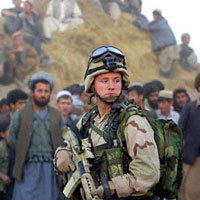- About Us
- Columns
- Letters
- Cartoons
- The Udder Limits
- Archives
- Ezy Reading Archive
- 2024 Cud Archives
- 2023 Cud Archives
- 2022 Cud Archives
- 2021 Cud Archives
- 2020 Cud Archives
- 2015-2019
- 2010-2014
- 2004-2009
 |
Ezy Reading: How Far In War Is Far Enough? |
With the rubble hardly even settled in the aftermath of the recent 7.6-magnitude earthquake that appears to have claimed some 20,000 lives in northern Pakistan, India and parts of Afghanistan, I was taken aback to hear a commentator rasping on television today that perhaps now was the ideal time for the United States to take advantage of rival elements in the so-called 'war on terror' crippled from effective action because of their current predicament.
This was the kind of spiel that shouldn't have been unexpected from such a firebrand right-winger. That said, I imagine that even in a tactical military sense he was talking hot air anyway, as it seems most of the Al Qaeda operatives the U.S might be able to target along the Afghanistan-Pakistan border really are, as reports indicate, living in caves and settlements far enough from real civilisation that the earthquake may have left them unaffected, plus it is unlikely, even if relief aid was used as a bargaining chip, that Pakistan's President Musharraf would allow a covert intervention to enter into an already stressed and difficult situation. Even more, it's worth considering that any potential individual or group targets for the U.S military in the region might well now be even harder to find at the moment anyway given the extent of the devastation and obvious confusion and disarray now in play.
 Still, even for a commentator who was no doubt merely stirring the pot, his suggestions raised the question of exactly wherein ethics might play a role in war, and I've little doubt that this is such an age old question there wouldn't be enough space to even attempt to adequately answer that question here. I'm sure it's not just conspiracy theorists who would freely admit that there's likely far more morally objectionable activity going on at the hands of governments -and especially by way of their special forces divisions- than we'd perhaps even care to know about, that is certain. But exactly how much needs be weighed into the argument before we can deem that it is 'okay' under a certain set of circumstances to act upon a situation?
Still, even for a commentator who was no doubt merely stirring the pot, his suggestions raised the question of exactly wherein ethics might play a role in war, and I've little doubt that this is such an age old question there wouldn't be enough space to even attempt to adequately answer that question here. I'm sure it's not just conspiracy theorists who would freely admit that there's likely far more morally objectionable activity going on at the hands of governments -and especially by way of their special forces divisions- than we'd perhaps even care to know about, that is certain. But exactly how much needs be weighed into the argument before we can deem that it is 'okay' under a certain set of circumstances to act upon a situation?
The simple answer surely lies in determining whether or not pursuing a particular course is valid so long as it can, regardless of being deemed objectionable, allow for greater good, and end loss and suffering in the long term (as the bombs on Hiroshima and Nagasaki were no doubt considered, leading as they did to the end of World War II).  Yet the problem in all this is that there is never a clear, black or white answer that can be definitively given as to whether or not we've correctly chosen the lesser of two or more evils, and I've little doubt that most military men have time for entering into philosophical debates about what truly is the meaning of 'just'.
Yet the problem in all this is that there is never a clear, black or white answer that can be definitively given as to whether or not we've correctly chosen the lesser of two or more evils, and I've little doubt that most military men have time for entering into philosophical debates about what truly is the meaning of 'just'.
No, the real, limited conclusion we have to accept is something we already knew: that war is ugly, never clean, and terms like 'collateral damage' and 'friendly fire' have become far too readily accepted in the mainstream as adequate explanations for action.
Whether a tragedy like a shattering earthquake can be used to advantage in times of war may well be a decision some are seriously addressing this very week in the interests of that greater good.
Ezy Reading is out every Monday.
